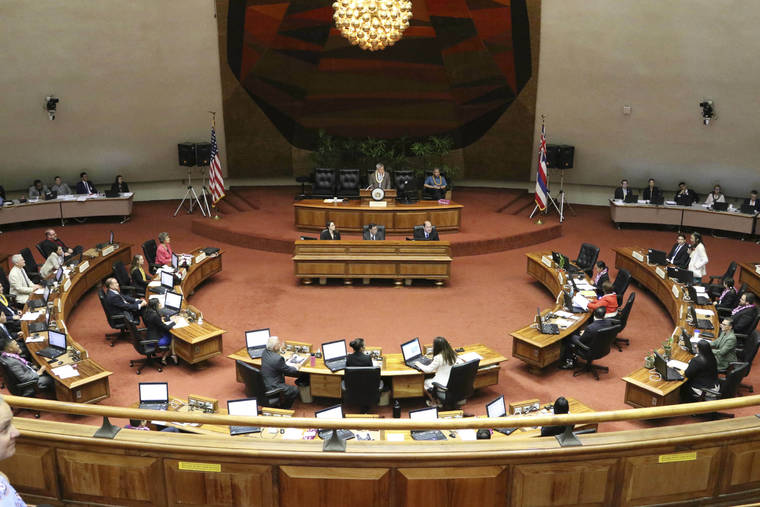HONOLULU — Attorneys argued before the Hawaii Supreme Court on Wednesday over how much lawmakers should allow the public to weigh in on legislation as laws are being drafted and voted on.
The justices listened to lawyers over a video link that was streamed live on YouTube. They were considering a lawsuit challenging the Legislature’s practice of stripping bills of their original content and substituting something entirely different.
The League of Women Voters of Honolulu and Common Cause Hawaii sued the state in 2018 over the tactic, which is often called “gut and replace” in Hawaii. Similar maneuvers in other states are called “gut and stuff” or “gut and amend.”
The lawsuit specifically challenges a law that started out as a bill about recidivism but ended up being about building hurricane-resistant schools. A state Circuit Court judge upheld the Legislature’s procedures, and the plaintiffs appealed to the state’s highest court.
Justice Michael Wilson asked Attorney General Clare Connors how the public is allowed to participate if lawmakers can completely change the contents of a bill when they meet during conference committee after hearings and public testimony have wrapped up.
Connors replied the state Constitution mandates that the lawmakers meet only two requirements: that a bill have a broad enough title that encompasses the changed content and that the bill be in its final form when it goes up for its last vote.
She said the Legislature needs flexibility to be able to substitute bill content to allow it to respond to unforeseen emergencies, like when it passed measures to respond to flooding on Kauai last year and this year when it passed legislation to address the coronavirus pandemic.
She said the plaintiffs want to be able to participate more in lawmaking, but whether they should be able to do so is a question of politics and not one for the courts.
“What this plaintiff’s argument does is it creates a confrontation, unresolvable, between two coequal branches of government,” Connors said.
Brian Black, an attorney with the Civil Beat Law Center for the Public Interest who represented the plaintiffs, said people respect the law when they have a right to engage in the legislative process. He compared it to people’s willingness to consume processed meat.
“People will eat sausage because there are rules that govern how it’s made. Similarly, people will respect the law because there are rules governing the legislative process that protect the public,” Black said.
Black told the justices, “We want to see the sausage made. The legislative process is not supposed to be a shell game that can only be followed by those in the know.”
Former Senate President Colleen Hanabusa, who is also an attorney and a candidate for Honolulu mayor, appeared before the court on behalf of the Legislature. She said online technology gives the public more access to the legislative process than before by allowing people to sign up for automatic notices on changes to bills.
Those without computers can use the Capitol’s Public Access Room, which has computers and staff to assist the public, and libraries, Hanabusa said.
She told the justices “you are interjecting yourselves into the legislative process” if they were to rule on what form or substance would be allowed in a bill.
Such a decision would open the door to lawsuits challenging bills on the grounds the contents didn’t match a bill’s title, she said.
“That means that every piece of legislation or every law that is passed, if anybody doesn’t like it, they come to the court and say, this wasn’t germane,” she said.





